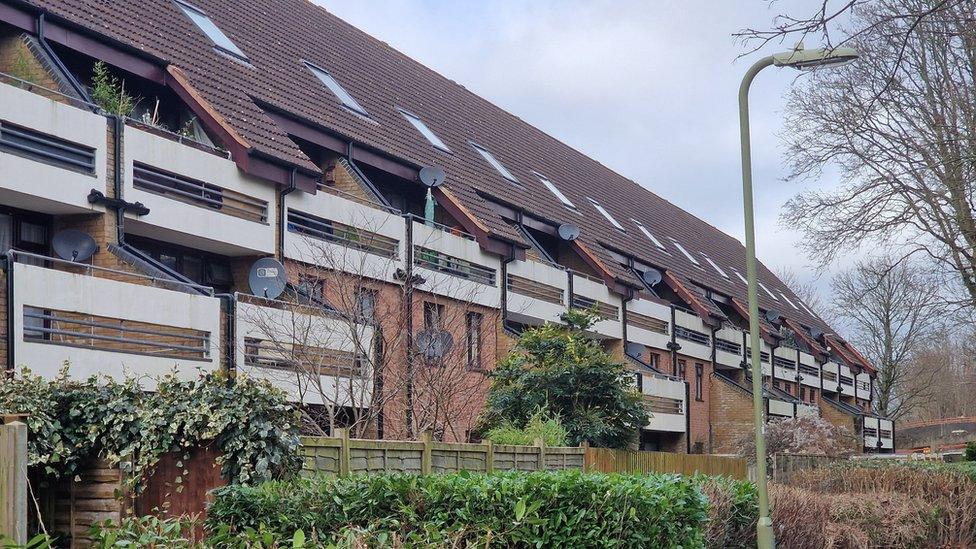Housing estate 'fleeceholds' the next great scandal, Tory peer warns
- Published
- comments

A Conservative peer - and ex-adviser to Boris Johnson - has warned "fleeceholds" will be "the next great scandal" to hit the housing market.
The term is used to describe the plight of homeowners on new-build estates locked into private maintenance contracts for communal areas.
More than 40 Tory MPs have called for a ban on such contracts.
Lord Moylan, who advised Mr Johnson when he was London mayor, blamed councils for abandoning their duties.
"They will accept the additional council tax that is generated by the new properties but they will not take on the responsibilities for maintaining those common amenities," he told peers during the Lords' second reading of the bill.
He added: "I think this is the next great scandal approaching the housing market."
It comes as 46 Tory MPs called on Housing Secretary Michael Gove to include a ban on "fleeceholds" to be included in the leasehold bill, which is working its way through Parliament.
About four million people are thought to be living under the private estates model.

Michael Gove has promised to reform the leasehold system
The "estate fees" emerge when a local council decides not to adopt the new area, leaving the builder - or more likely a third party management company - with responsibility for roads and green spaces.
The Competition and Markets Authority (CMA) has also recommended ending the private estates model, which has been used by for 40% of all new builds across Britain in the last five years, and recommending the mandatory adoption of public amenities on new housing estates by local councils.
A leasehold is where homeowners do not own the land their property is built on but instead lease it from a landlord for as many as 999 years and are sometimes subject to ground rent and maintenance charges.
Mr Gove has labelled leaseholds "an outdated feudal system that needs to go", and the bill would ban the creation of new leasehold houses in England and Wales. However, it does not do the same for flats, which make up around 70% of leasehold homes.
The government has also consulted on capping ground rents to a "peppercorn" amount, which is intended to encourage landlords to sell up to leaseholders.
But there has been fierce opposition to reform of leaseholds, which still affect one-in-five homes in the UK, including from the Treasury, which claims altering contracts could be deeply damaging to investment.
Housing minister Baroness Scott of Bybrook told peers the government recognised fleeceholds were a problem, saying "it's not right" for homeowners to be trapped in a contract with one management company, which may charge unreasonable fees, with no effective way to hold them to account.
She said: "It is up to the developers and the local planning authority to agree on specific issues relating to new development, including appropriate funding and maintenance arrangements."
However, she also said the government was "carefully considering" the CMA's report calling for an end to the private estates model.
As well as strengthening consumer protections, the CMA is also considering increasing the extent to which amenities are taken on by councils.
Social housing champion Lord Best called for a regulator of property agents to help address fleeceholds, among other leasehold issues.
The independent crossbench peer said: "Sadly, there are all too many examples of mis-selling, exorbitant service charges, lack of transparency and accountability, overpriced leasehold management...
"The role of a new regulator of property agents would be to encourage and support the good, raise standards and drive out the bad."
Related topics
- Published26 March 2024

- Published26 February 2024

- Published9 February 2024
